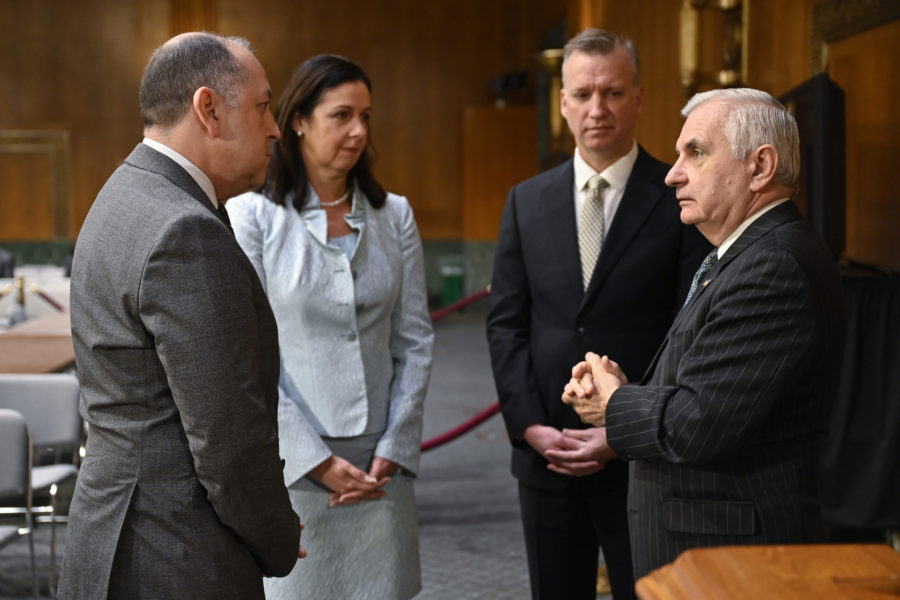Senate Armed Services Committee chair Sen. Jack Reed (D-R.I.) thinks there will be strong bipartisan support—both in the Armed Services and Appropriations committees—to increase production of munitions and build up the defense industrial base.
Speaking in a webcast with the Center for New American Security, Reed said the fiscal year 2023 National Defense Authorization Act took steps to provide for multiyear procurement of munitions, which signaled to industry that “we’re in it for the long term; that they can be confident of having a demand so they can adequately staff and…supply their industries and produce these weapons systems” economically.
Expect similar moves in the 2024 NDAA, Reed suggested. Committees in both houses are “looking very, very closely during this NDAA at what other steps we can take to enhance the nation’s … industrial base,” he said.
However, while there’s bipartisan support for increased military spending, some Republicans on Capitol Hill have called for cutting the government’s overall budget back to fiscal 2022 levels, with the cuts coming entirely from non-defense spending.
Reed criticized that approach, noting that in the past several years, Congress has come together in a bipartisan way to boost defense spending and provide for the services’ unfunded priorities lists.
“We were able to reach a number that was satisfactory, and also did not punish domestic spending,” Reed said. Cutting “valuable programs for non-defense … [is] going to cause a tremendous controversy, to be polite.”
Still, the worst possible outcome, Reed suggested, would be a continuing resolution, under which spending levels are frozen at the previous year’s level and new starts are halted.
“That has been strenuously voiced to us by every commander that’s come before the panel,” he said.
Surge Production
The need for more robust weapons production has been highlighted by Ukraine’s war against Russia and the U.S.’s diminishing stockpiles as it gives hundreds of millions of dollars worth of munitions to the Ukrainians.
However, surging production has proven to be a challenge, and Reed argued the U.S. lost that surge capability during the advent of the AirLand Battle concept, in which it was assumed that conflicts would be “a very short-term effort because of precision weapons; because our ability to overwhelm and control the sky.”
“The concept was that we didn’t need that elaborate defense industrial base [and] munitions because these [would be] very swift victories,” Reed said.
The conflict in Ukraine, however, has resulted in “a huge volume of munitions consumed by both sides,” and as a result, the U.S. must reconsider its plans and invest in production capacity, Reed said.
Such industrial base initiatives will receive “support throughout the Congress on a bipartisan basis … to reinvigorate our industrial base for military procurement. It makes quite a bit of sense,” Reed added.
In addition to increased capacity, Reed also said Congress and the Pentagon should look to invest in and develop new technologies and get rid of those that are no longer useful.
“That’s a significant aspect of deterrence,” he said. The U.S. has to make “hard choices” about “not only what new systems to invest in, but what systems are not particularly capable to engage in this new type of warfare.”
He said the Navy’s Littoral Combat Ship is emblematic of the situation. Expectations that the Navy would be more involved in “brown water operations” in the future have been pushed aside by the need to compete with the Chinese navy in “blue water” scenarios, Reed said. The LCS is “no longer relevant” to the likely fight, and the Navy must change tack.
Support for Allies
In addition to investing in the industrial base, Reed also advocated for reforming the International Traffic in Arms Regulations (ITAR) rules and the Foreign Military Sales process.
Allies are waiting too long to get weapons they need to partner with the U.S., and potential allies can turn to China, which can supply weapons much faster, though of an inferior quality, Reed said. Relaxing regulations will also help the industrial base by increasing the volume of certain munitions produced.
For Ukraine in particular, Reed cited air defense systems as a top need. Noting the pending arrival of dozens of Western battle tanks, Reed said air defenses will be their backstop.
Ukraine has been “shooting down the vast majority of the incoming missiles as well as the drones that Russia has been using,” Reed said. And while they have been less successful shooting down hypersonic missiles, “they’ve done a really effective job, using a patchwork of systems from a lot of different countries.
